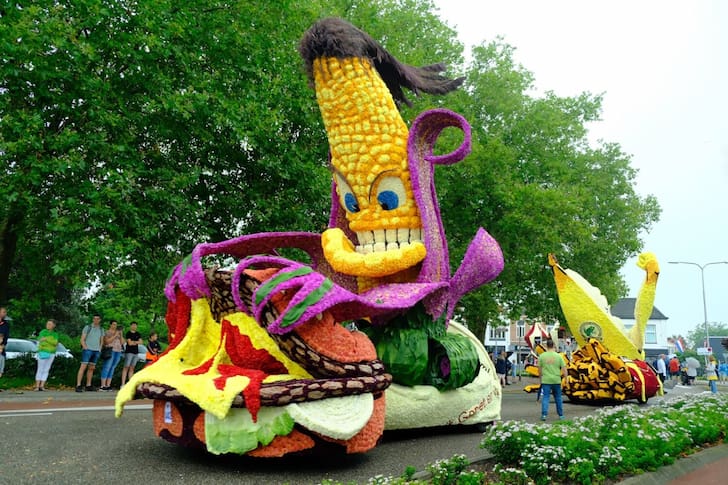An annual folk fair was founded in Winterswijk in 1543. However, the mayor and aldermen of the municipality abolished it in 1875 due to excessive alcohol consumption. The residents of Winterswijk then came up with the idea of a new festival that would be more family-friendly. The inaugural Volksfeest was held on September 25, 1876. It featured folk games, theater performances, a puppet show, hot air balloons, and fireworks.
The Volksfeest became an annual event in 1880. A costumed parade was added to the festival program in 1895, and a flower parade was held for the first time in 1897. Since 1906, the flower parade (Bloemencorso) has been held every year and has become an indispensable part of the festival. At first, floats were horse-drawn. As time went on, horses were replaced by tractors. Nowadays, papier-mâché floats decorated with flowers are usually mounted atop various vehicles.
The Volksfeest and Bloemencorso Winterswijk is held on the last weekend of August, beginning on Thursday evening and lasting until Sunday evening. The festival opens with an open-air concert of the Excelsior music association or the Royal Winterswijk Orchestral Society (Koninklijke Winterswijkse Orkest Vereeniging, KWOV) in collaboration with other local performers. On Friday and Saturday, there are more live performances in the musical tent on the Market Square and in other locations across Winterswijk.
The flower parade is held on Friday and Saturday mornings. It features about 50 floats, smaller vehicles, and even bicycles, all decorated with dahlias. Every year, more than 1.5 million flowers are used to create the parade floats. The parade also features marching bands of local music associations, and two guest bands join the procession on Saturday. On Friday, the best floats are chosen by a jury and by the public, and an award ceremony is held in the evening. After the Saturday parade, the floats are displayed at the Tricot factory during Saturday and Sunday.
The festival program also includes other fun events and activities, such as a fair, children’s games, a children’s ball, and a target shooting competition. The Volksfeest concludes with the Frühschoppen, an entertainment program held on Sunday afternoon. Back in the day, the festival program used to include various horse-related events such as a horse market and horse riding competitions. However, they were moved to Queen’s Day in 1988 and are now held on King’s Day (the holiday changed its name and date in 2013, when Willem-Alexander succeeded his mother Beatrix and became the King of the Netherlands).
In December 2013, the Volksfeest Winterswijk was added to the National Intangible Cultural Heritage Inventory of the Dutch Center for Popular Culture and Intangible Heritage to highlight its historical and cultural significance.

Photo: volksfeest.nl




